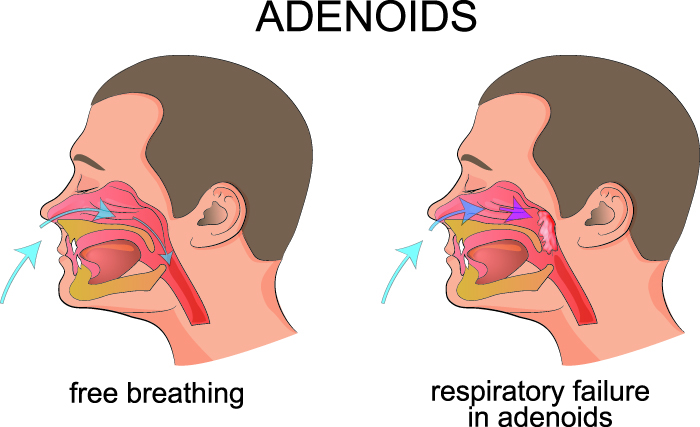Best Adenoidectomy Procedure in Kondapur, Hyderabad
The adenoid glands are removed during an adenoidectomy or adenoid removal.
While adenoids aid in the protection of the body against viruses and bacteria, they can become bloated, enlarged, or diseased with time. Infections, allergies, and other factors may be to blame. Some children are born with adenoids that are unusually big.
When a child's adenoids expand, they might partially block his or her airway, causing difficulties. Children may experience breathing issues, ear infections, or other troubles as a result of this, which can result in snoring or more serious disorders such as sleep apnea (breathing stops) at night.

What is the procedure for an adenoidectomy?
An adenoidectomy is a simple, quick surgery performed by an ENT surgeon at Apollo Kondapur as an outpatient treatment. For the procedure, your child will be put under general anaesthesia.
During surgery, your child's mouth will be opened wide using a retractor while he or she is sleeping, and the adenoids will be removed using one of many procedures. To assist stop the bleeding, the doctor may employ an electrical device.
Your youngster will then be transported to a recovery room while the anaesthetic wears off. The majority of youngsters will be able to go home the same day as their operation.
What Are the Signs and Symptoms of Enlarged Adenoids?
The doctor may inquire about, then examine, your child's ears, nose, and throat, as well as feel the neck and jaw. The doctor may use X-rays or a small telescope to see inside the nose canal for a closer look.
A doctor may prescribe several forms of medicine, such as tablets or liquids, to treat a suspected illness. To assist decrease swelling in the adenoids, nasal steroids (a liquid injected into the nose) may be given.
Request an appointment at Apollo Spectra Kondapur.
Call 1860 - 500 - 2244 to book an appointment.
What Is an Adenoidectomy and How Does It Work?
The surgical removal of the adenoids is known as an adenoidectomy (ad-eh-noy-DEK-teh-me). It, along with the removal of tonsils, is one of the most common surgical operations performed on children.
What are the Side effects of having an adenoidectomy?
The following are some of the dangers associated with an adenoidectomy:
- Inability to address underlying respiratory issues, ear infections, or nasal drainage
- a lot of blood (very rare)
- Changes in voice quality that are permanent
- Infection
- Risks associated with the use of anaesthetic
Before you consent to adenoidectomy, your doctor should clearly explain all of the dangers and answer all of your questions.
Right candidates:
Before suggesting adenoid removal, the doctor will consider the medical history of the kid. If one or more of the following issues arise, this treatment may be beneficial:
- enlarged adenoids cause snoring or sleep apnea
- ear infections that do not react to medicines on a regular basis
- Adenoid oedema causes a buildup of fluid in the ear and earaches.
- Infection of the adenoids that does not respond to medications on a regular basis
- Adenoids interacting with sleep cause excessive daytime drowsiness.
- Sleep deprivation can cause problems with behaviour or learning.
A kid nearly always recovers completely after an adenoidectomy, leading to a healthier life with significantly fewer respiratory and ear issues.
During adenoidectomy, doctors generally put children under general anaesthesia, which means they will be asleep and unable to feel discomfort. To avoid vomiting during the operation, it is necessary to fast for many hours before the treatment.
Symptoms
Our Doctors
DR. DASARI PRASADA RAO
MBBS,MS,M.Ch...
| Experience | : | 49 Yeras Experience |
|---|---|---|
| Speciality | : | Interventional and C... | Location | : | Ameerpet |
| Timings | : | Mon - Sat : 9:00 AM ... |
DR. MOHAMMED NASEERUDDIN
MBBS, MS (ENT)...
| Experience | : | 8 Yeras Experience |
|---|---|---|
| Speciality | : | ENT, Head and Neck S... | Location | : | Kondapur |
| Timings | : | Mon - Sat : 11:00AM... |
DR. PUROHITHI P
MBBS, MD, IDRA, FIPM...
| Experience | : | 4 Yeras Experience |
|---|---|---|
| Speciality | : | Sr. Interventional P... | Location | : | Kondapur |
| Timings | : | Mon - Sat : 5:00 PM ... |
DR. CHINNAYA PARIMI
MBBS, FACS (Fellow, ...
| Experience | : | 19 Yeras Experience |
|---|---|---|
| Speciality | : | General Surgery & Ga... | Location | : | Kondapur |
| Timings | : | Mon - Sat: 9:30 AM t... |
Our Top Specialities
NOTICE BOARD
CONTACT US
CONTACT US
 Book Appointment
Book Appointment






.svg)
.svg)
.svg)
.svg)








